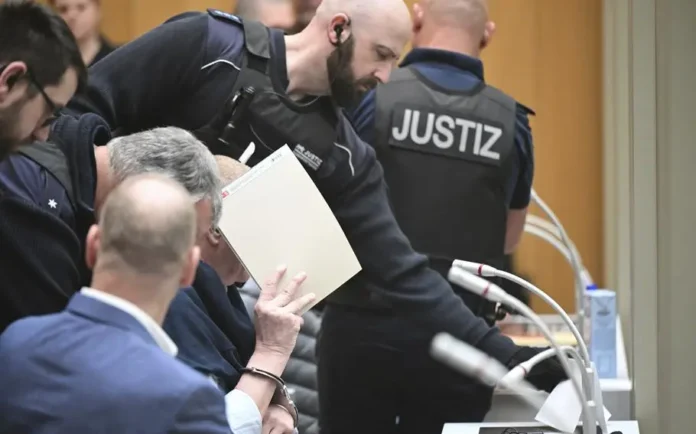Nine Face Trial In Germany For Alleged Coup Plot
The first proceedings in a sprawling multipart trial against members of an alleged far-right plot to attack the German parliament and overthrow the government began in Stuttgart on Monday.
Nine members of the group led by the minor aristocrat and businessman Prince Heinrich XIII Reuss will take the stand in the southwestern city.
They included, among others, a special forces soldier, a former far-right MP, an astrologer, and a well-known chef.
Prosecutors accuse them of preparing a “treasonous undertaking” to topple the German government.
The affair is the most high-profile recent case of far-right violence, which officials say has grown to become the biggest extremist threat in Germany.
The complexity of the trial and the need for extra security measures has seen proceedings against the alleged plotters split across three courts.
Reuss, who was set to be installed as head of state after the supposed coup, will face trial in Frankfurt in May, while a third set of proceedings will open in Munich in June.
The alleged putschists are said by prosecutors to have espoused a mix of “conspiracy myths” drawn from the global QAnon movement and the German Reichsbuerger (Citizens of the Reich) scene.
The Reichsbuerger movement includes right-wing extremists and gun enthusiasts who reject the legitimacy of the modern German republic.
Its followers generally believe in the continued existence of the pre-World War I German Reich, or empire, under a monarchy, and several groups have declared their own states.
‘Hatred of democracy’
Such Reichsbuerger groups were driven by “hatred of our democracy”, Interior Minister Nancy Faeser said in Berlin on Sunday.
“We will continue our tough approach until we have fully exposed and dismantled militant ‘Reichsbuerger’ structures,” she added.
According to investigators, Reuss’s group shared a belief that Germany was run by members of a “deep state” and that it could be freed with the help of a secret international network, known as the “alliance”.
The suspects on trial in Stuttgart are alleged to have belonged to the “military arm” of the coup plot, tasked with establishing “territorial defence companies”.
Among the accused are a special forces soldier, identified only as Andreas M., who is said to have used his access to scout out army barracks.
Others were allegedly responsible for the group’s IT systems or tasked with liaising with the fictitious “alliance”, which they thought would rally to their aid when the coup was launched.
The nine include Alexander Q., who is accused by federal prosecutors of acting as the group’s propagandist, spreading conspiracy theories via the Telegram messaging app.
Two of the defendants, Markus L. and Ralf S., are accused of weapons offences in addition to the charge of treason.
Markus L. is also accused of attempted murder for allegedly turning an assault rifle on police and injuring two officers during a raid at his address in March 2023.
Police swooped in to arrest most of the group in raids across Germany in December 2022 and the charges were brought at the end of last year.
Three-part trial
In all, 26 people are accused in the affair split across three courts, with the proceedings in Stuttgart set to continue until early 2025.
Reuss will stand trial in Frankfurt from May 21, alongside another ringleader, the ex-army officer Ruediger V.P., and a former MP for the far-right Alternative for Germany (AfD) party, Birgit Malsack-Winkemann.
The Reichsbuerger group had allegedly organised a “council” to take charge after their planned putsch, with officials warning preparations were at an advanced stage.
The alleged plotters had resources amounting to 500,000 euros ($536,000) and a “massive arsenal of weapons”, according to federal prosecutors.
Long dismissed as malcontents and oddballs, believers in Reichsbuerger-type conspiracies have become increasingly radicalised in recent years and are seen as a growing security threat.





